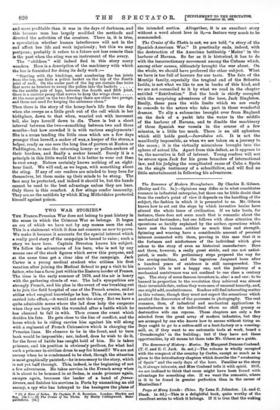TWO WAR STORIES.*
THE Franco-Prussian War does not belong to past history in the sense in which the Crimean War so belongs. It began an era of which we have not by any means seen the end. This is a statement which it does not concern us now to prove. We make it because it accounts for the special interest which a really good story of the campaign is bound to raise ; such a story we have here. Captain Brereton knows his subject. We follow the adventures of his hero, who is not by any means one of the stock figures which serve this purpose, and at the same time get a clear idea of the campaign. Jack Carter is a young medical student who utilises his first vacation after joining the Medical School to pay a visit to his father, wbo has a farm just within the Eastern border of France. The time is the early summer of 1870, and the air is heavy with the gathering clouds of war. The lad's sympathies are strongly French, and his plan in the event of war breaking out is to join the field hospital of one of the French armies, and so utilise what surgical knowledge he has. This, of course, is not carried into effect,—it would not suit the story. But we have a quite admirable scene where the lad does help the surgeons when they are busy with the wounded after a battle which he has chanced to fall in with. Then comes the event which decides his fate. He gets close to the line of conflict, and the horse which he is riding carries him against his will along with a regiment of French Cuirassiers which is charging the Prussian lines. He chances to be in the front, and to turn back would be impossible; nor, indeed, does he wish to do it, for the fever of battle has caught hold of him. He is taken prisoner, and his position is obviously perilous, for what bad such a prisoner in civilian dress to say for himself ? We are not uneasy when he is condemned to be shot, though the situation is most graphically painted,—he is necessary to the story, which is not yet half through. This, indeed, is the beginning of not a few adventures. He takes service in the French army when it is about to be hemmed in at Sedan, is made prisoner again, escapes again, becomes the leader of a band of 'tants- fireurs, and finishes his services in Paris by unmasking an old enemy, a spy who has betrayed to the besiegers the plans of • (I) .4 Moro 4.1' Sedan. By Captain F. 8. Brenton. London: Mackie and Bon. [60:1— The Cruise of the 174clis. By Barra Centreretea. Same publishers. [5s.
the intended sorties. Altogether, it is an excellent story without a word about love in it,—a feature very ranch to be commended.
The Cruise of the Thetis is not, we are told, "a story of the Spanish-American War." It practically ends, indeed, with the destruction of the American battleship 'Maine' in the harbour of Havana. So far as it is historical, it has to do with the insurrectionary movement among the Cubans which, among other causes, ultimately brought the wat about. On the whole, we should have preferred the other subject. What we have is too full of horrors for our taste. The fate of the Montijo family, especially the tragical end of the Sefiorita Isolda, is not what we like to see in books of this kind, and we are not reconciled to it by what we read in the chapter entitled "Retribution." But the book is chiefly occupied with the surprising adventures of the hero, Jack Singleton. Really, these pass the wide limits which we are ready to concede to the actors who take part in these wonderful dramas. To slip a submarine brought over from England on the deck of a yacht into the water in the middle of the harbour of Havana, and to disable the machinery of three Spanish war vessels in the course of a few minuted, is a little too much. There is an old aphorism which still holds good,—Intredulus odi. It is not the manifestly impossible, as when we are taken on a journey to the moon ; it is the virtually miraculous brought into the sphere of actual life. Apart from this defect, as it appears to us, the narrative is full of interest. Young readers will not be severe upon Jack for his gross breaches of international law, and his judging the complicated cause of Cuba v. Spain on the single testimony of a schoolfellow, and will find no little entertainment in following his adventures.
























































 Previous page
Previous page